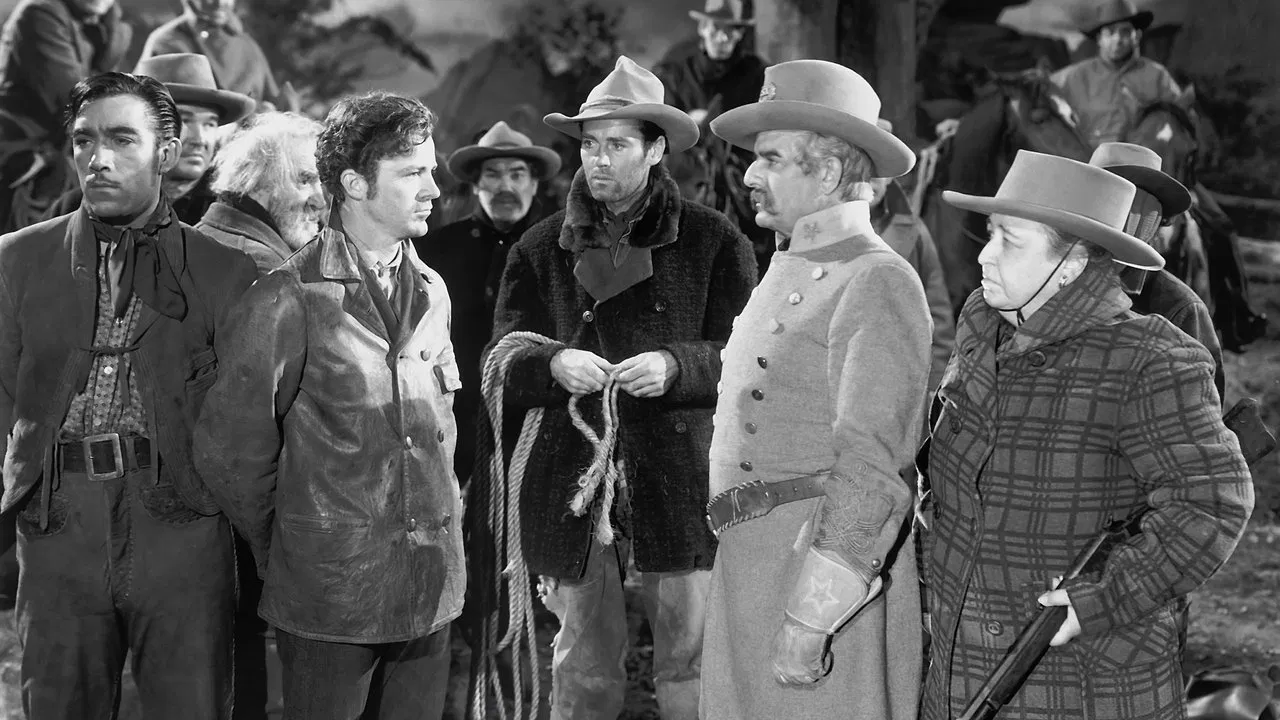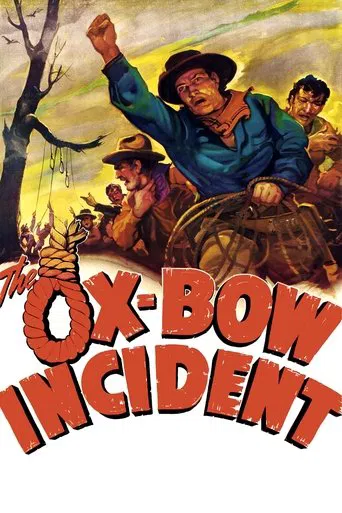

recommended
... View MoreWhat a freaking movie. So many twists and turns. Absolutely intense from start to finish.
... View MoreA great movie, one of the best of this year. There was a bit of confusion at one point in the plot, but nothing serious.
... View MoreThe acting in this movie is really good.
... View MoreLynching - a peculiarly American phenomenon of mob violence. No less than 231 such acts were recorded in 1892. Even in 1943 three lynchings were reported) - had been dealt with in other films, most notably Fritz Lang's Fury (1936) and Mervyn LeRoy's They Won't Forget (1937). And it has been the theme of some notable films since, including Sound of Fury, Storm Warning, Riding Shotgun, Silver Lode and Intruder in the Dust. But none of these similar pictures take the uniquely objectivist view of The Ox-Bow Incident. It is a film with many villains, some familiar (the mischief-stirring town drunk, for instance, but played here with such powerful malevolence by Paul Hurst as to seem horribly original), some quite extraordinary by the prissy standards of 1942 Hollywood (particularly the loud-mouthed, lewd sadist given such vitality by Jane Darwell, of all people), ranged against twelve heroes - twelve good men and true.But examine these twelve men more closely. Three of them are the victims, powerless in their own defense: A feeble-minded, fearful old man (Francis Ford in one of his most convincing roles); a cocky but philosophically resigned Mexican (Anthony Quinn); and most importantly, an eloquently idealistic but extraordinarily stupid and impractical greenhorn living in a cloud-cuckoo land of mind-boggling naivety. It is one of the film's faults that neither as written nor played is this character sympathetic or believable. He is too stupid for credibility. We assume that it is all an act, that he will turn out to be the cunning bushwacker the villains suppose him to be. No doubt this is intentional - the director seizes upon the actor's immaturity and weaknesses to fill out the character - but it doesn't work, because we feel so little sympathy for him.Point one for curious objectivity. Point two is the fact that two of the good guys are away and arrive too late on the scene to prevent the tragedy. That makes The Ox-Bow Incident really unique.Point three are the seven men left: A well-intentioned but patronized Negro (played with a simple if "yes, massah" dignity by Leigh Whipper); a reluctant-to-be-involved cowhand (Fonda) and his even less willing buddy (Morgan); a weak, impotently defiant mother's boy (Eythe); two characters so minor they don't matter; and finally, a garrulous, whining old man (cleverly pitched by Harry Davenport to antagonize or irritate any audience).This indeed is a remarkable assembly of uniquely unsympathetic characters. But there are more: A heroine (Mary Beth Hughes) who has reneged on her promise to marry the cowhand and has instead hitched herself to a sneering, supercilious San Franciscan (Meeker); a pompous windbag of a judge (Briggs); his frosty housekeeper (Margaret Hamilton).We could go on. Remember these are the "good" people. We have scarcely mentioned the other side, led by Frank Conroy's fanatic old Confederate, and including Paul E. Burns in a rare, unsympathetic role as a rope-wielding lyncher and impressively-visaged Rondo Hatton who has no dialogue but can be glimpsed at the back of several scenes.Yes, The Ox-Bow Incident is unique. An uncompromisingly dark film with no conventional heroes or romance. Yet, despite its defiance of all the conventions, its powerful message succeeds in coming across.This success of course is no accident, but is the result of a tight unified script being convincingly played, set and directed, being atmospherically photographed and scored. True, Ox-Bow is no towering masterpiece of filmcraft - the film's limited budget has seen to that: The few actual location exteriors (including a memorable image of the hard-riding posse with Sparks trailing behind and gradually becoming enveloped in their dust) make an unwelcome contrast with obvious studio sets. The direction is inclined to be too stylish with the characters arranged in toe-the-line tableaux (an impression reinforced whenever Frank Conroy is on-screen, he stands so stiffly. Admittedly, this is certainly in character). However, these are minor defects, which do little or nothing to detract from the overall somber mood. Even the comedy is sad. And Mockridge's score with its plaintive "Red River Valley" played by a lonely concertina over the paralleled opening and closing shots is a memorable finishing touch.A courageous film, a unique film, a powerfully engrossing film, a film years ahead of its time, a film with a soberingly realistic atmosphere. The Ox-Bow is the real West. Even a much-touted realistic film like Cowboy (1958) is glossily romanticized. You'd have to go back to the silent days for similarly realistic atmosphere - particularly to Hell's Hinges (1919) directed by and starring William S. Hart.
... View More"Hangin' is any man's business that's around." Henry Fonda's father took him to the site of a lynching that occurred the previous morning and told young Henry that statement, and that line was used in the movie at Henry Fonda's insistence. It's hard to watch movies like this because it exposes the soul of every man. At a tight 75 minutes, the plot and dialogue move along at a good pace. Beautiful performances by Dana Andrews and Anthony Quinn along with the reaction shots of the mob after the final realization of their lynching leave an indelible mark on the watcher. It was nominated for an Oscar for Best Picture and in 1998 it was selected for preservation in the United States National Film Registry by the Library of Congress as being "culturally, historically, or aesthetically significant".
... View MoreJust seen this movie, I have to say I'm absolutely delighted! The Ox-Bow Incident can be safely ranked as one of classic cinema's great movies. Praised by critics worldwide, it has still received very little public recognition and appreciation and it is about time this changed. It was never considered a success at the time of release, especially by mogul Darryl F. Zanuck who never considered a movie a success of any kind if it lost at the box-office. However, over the years it has become an artistic success with fans who appreciate good movie- making when they see it. Unlike other westerns from the golden age of cinema, this one doesn't focus on Cowboys and Indians or other such entertainment subjects, but instead the story is of a much more absorbing and long-lasting nature. It is also very nice framed(rope shots), and has a very interesting dialogue. Some elements of the movie's story may be similar to another classic about justice, "12 angry men". The movie is also having very nice cinematography, even though it is black and white. Speaking about acting, the best directed characters were for sure Jane Darwell's and Henry Fonda's. It also has a very sad plot twist at the end.I won't spoil the end but it is a little bit complicated for me. If you are looking for a nice thriller, you found it!
... View MoreTHE OX-BOW INCIDENT is the film in which violence and lynching by a mob shown in quite real terms. Compassion and mercy has no place. Each character in the crowd has their own beliefs for which he has to take a human life. In this respect man nor see nor hear the sense that in a certain form is always there. I think it is not a purely commercial act. The film is uncompromising between horror and human morality.Revenge is "unclear" motive. Each character has a specific motive to prove to themselves and others. Characterization of the characters is excellent and the film definitely in this segment is gaining traction. The film is short and the story focuses on the lynching. After all, the plot suggests. The scenario is a cold and realistic. Notwithstanding any contrary opinion, the situation of the film we can imagine in today's terms.We have not learned.Henry Fonda as Gil Carter was from the beginning moody character. Enigmatic and bitter. The reason is certainly there. The woman! A strange sense of justice and guilt. Dana Andrews as Donald Martin, one solid heartbreaking performance, consistent with the weakness and disturbing tragedy. In a letter to the essence. Frank Conroy as Major Tetley is a demagogue in his officer's uniform that is certainly not worth it. He is presented as a major figure of human evil.One very important film. I do not believe that someone would enjoy it. From this depressing and unpleasant western drama is something can be learned. Definitely.
... View More